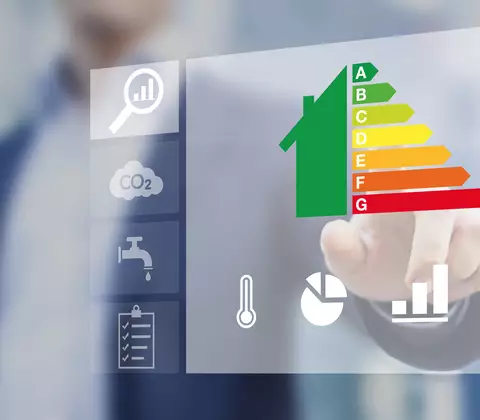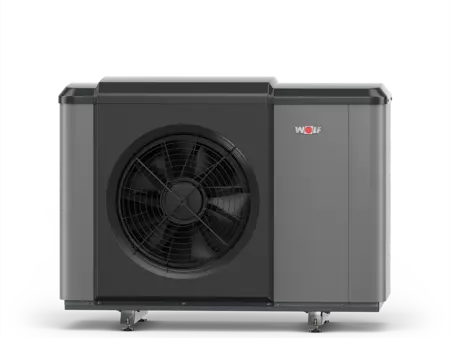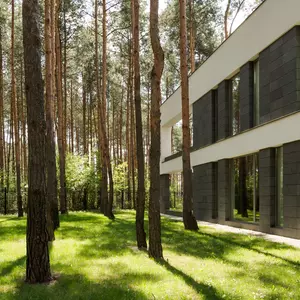The number of occupants may not affect the energy required for heating a building, but it does affect the amount of hot water needed.

Electricity consumption of heat pumps
Heat pumps can either be used to support fossil fuel heating systems or be used as sole heating systems. They extract heat from the ground, groundwater or ambient air, compress it and transfer it to heat buildings. This process requires electricity. Read on to find out all about the electricity consumption of heat pumps and the electricity costs this incurs.
How do heat pumps work?
Heat pumps are operated using electrical current but draw a much greater proportion of their energy from environmental heat sources, such as the air, groundwater or soil. Accordingly, these systems are referred to as air-to-water heat pumps, water-to-water heat pumps or brine-to-water heat pumps.
You can find information on WOLF heat pumps here. They can be combined with further innovative systems, such as solar thermal technology.
Air-to-water heat pump
CHA-MONOBLOCK
The WOLF CHA Monoblock heat pump is sure to fit in with the overall design of your home, and is perfect in the garden, out on the patio or mounted on the wall – all with an impressive COP of 4.65.

All models work in the same way. They form a closed circuit containing an evaporator, compressor, condenser and expansion valve. Coolant flows through the circuit and draws heat from the environment. This causes it to vaporise in the evaporator.
The heat pump compresses and heats this gas in the compressor using electric power. In the condenser, the hot gas heats the heating water, cools rapidly and returns to a liquid state.
The expansion valve reduces the pressure of the liquid and the coolant cools still further. Finally it flows back to the evaporator and the cycle begins again.
What determines how much electricity a heat pump consumes?
There are geothermal heat pumps, air source heat pumps and hot water heat pumps. The electricity consumption depends on the type of heat pump used.
A heat pump that is solely responsible for the entire heating output and that supplies the building with hot water consumes more electricity than a system that is only used to back up a fossil fuel heating system.
Obviously, larger houses require a higher heating output. Draughty windows and doors increase the heating requirements. So these aspects naturally affect the electricity consumption of a heat pump.
This is a very important point. Good insulation has a greater impact on the required heating energy than almost any other factor.
The SPF and the electricity consumption of a heat pump
The seasonal performance factor, mostly abbreviated to SPF, indicates the efficiency level of the heat pump. It tells you how much consumed electricity is converted into heat energy. It is observed over the period of one year.
The actual SPF can only be calculated retrospectively by measuring the electricity consumption and the amount of heat produced. However, you will have to state the SPF before you can apply for heat pump subsidies from the Federal Office for Economic Affairs and Export Control (BAFA).
It is calculated from the technical specifications of the heat pump and the heating system using a statistical method. And no need to worry – you don’t have to do this yourself. The WOLF SPF calculator can do it for you.
Factors that can increase the electricity consumption of a heat pump:
- A long heating season and/or cold summer months raise your heat requirements and consequently the heat pump’s electricity consumption.
- New buildings often still contain some moisture. This needs heat to dry out and so also increases the heat requirements.
Example calculations of the electricity consumption of a heat pump
You can calculate the electricity consumption of a heat pump using the following formula:
- Heating output per year / SPF
Please remember that the SPF of the heating system is different from that of the DHW heating system.
Example calculations by type of heat pump
The following examples for the different types of heat pump assume heating requirements of 10,000 kWh/year. We also assume that 60% of the energy will be used for the heating and 40% for the DHW. That means 6000 kWh/year for the heating and 4000 kWh/year for the hot water.
| Heat pump type | Heating SPF | DHW SPF | Electricity consumption for heating | Electricity consumption for water | Total electricity consumption |
|---|---|---|---|---|---|
| Geothermal heat pump | 4.0 | 3.8 | 6000 kWh/year 4.0 = 1500 kWh/year | 4000 kWh/year 3.8 = 1052 kWh/year | 1500 kWh/year + 1052 kWh/year = 2552 kWh/year |
| Air source heat pump | 2.8 | 2.4 | 6000 kWh/year 2.8 = 2143 kWh/year | 4000 kWh/year 2.4 = 1666 kWh/year | 2143 kWh/year + 1666 kWh/year = 3.809 kWh/year |
| Water source heat pump | 4.8 | 4.5 | 6000 kWh/year 4.8 = 1250 kWh/year | 4000 kWh/year 4.5 = 888 kWh/year | 1250 kWh/year + 888 kWh/year = 2138 kWh/year |
The cost of electricity consumed by heat pumps
The electricity costs of a heat pump can be calculated as follows:
Total electricity consumption of the heat pump x electricity price
Example calculations by type of heat pump
We assume an electricity price of 21 cents/kWh. In our examples, the resulting electricity costs would be as follows.
|
| ||
|---|---|---|---|
Geothermal heat pump |
| ||
Air source heat pump |
| ||
|
|
How to reduce the electricity consumption of heat pumps
- Some utility companies provide a special reduced electricity price for heat pumps.
- Radiant heating systems, such as underfloor heating, use low flow temperatures so the heat pump uses less electricity as a result.
- Solar thermal technology can cover DHW heating, at least in the summer. This means that you only need to use the heat pump in the winter and thus use less electricity.
- Good insulation of the house is the most effective measure for lowering the required heating output as far as possible and reducing the electricity consumption of heat pumps.
- A further crucial measure is ensuring that the heat pump is perfectly adjusted to the heating system. This is a job for a professional. You can find a heating engineer near you here.
Reducing the electricity costs of heat pumps by using hybrid systems
Installing heat pumps is becoming ever more popular, especially in new buildings. These innovative heating systems are not only environmentally friendly, they also cut heating costs in the long run.
You can also cut electricity and heating costs by using combination systems, such as a heat pump plus solar thermal technology.
However, before purchasing and installing a new heating system, you should definitely consult the professionals. A heat pump can only work efficiently and cheaply if it is perfectly suited to the building in question.


